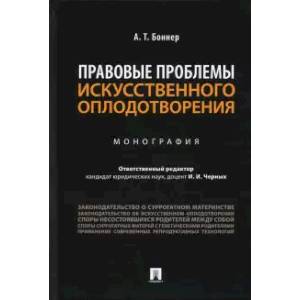Legal Issues of Artificial Fertilization. Monograph
Please sign in so that we can notify you about a reply
In 2010, Russia entered the demographic peak due to the catastrophic reduction of the able-bodied population. Mortality is growing, and the birth rate falls, not least due to the infertility of many women and men.
In recent years, the use of auxiliary reproductive technologies (ART) has been increasing more and more widespread. At the same time, the legislation in this area has many spaces. This explains the emergence of a relatively large number associated with various aspects of the application of CITs. They sometimes participate in the and failed genetic parents, surrogate mothers, state bodies, medical institutions, as well as various intermediary structures.
Having analyzed a significant judicial practice, the author provides both exemplary decisions on such specific cases and judicial acts made with a significant violation of laws and grossly violating the rights and interests of failed parents and other persons, and most importantly, children.
In the work, other urgent and requireing issues are discussed. Among them:
- Does a lonely man have the right to apply the technologies of ART?,
- "Life after death" or some legal problems of the posthumous reproduction of a person,
- the use of modern reproductive technologies and the problem of the anonymity of donors of germ cells,
- international legal problems of artificial fertilization: far from always coinciding views on various legal aspects of problems related to the use of auxiliary reproductive technologies of the European Court of Human Rights, the Constitutional and Supreme Courts of the Russian Federation, as well as lower courts of general jurisdiction.
The legislation is given as of December 1, 2019
Work written in the genre of a popular monograph is easy to read with interest. For employees of courts, prosecutors and advocates, other practitioners of lawyers, scientists, students and graduate students of legal universities, as well as everyone who is interested in the legal aspects of the problem of applying reproductive technologies
In recent years, the use of auxiliary reproductive technologies (ART) has been increasing more and more widespread. At the same time, the legislation in this area has many spaces. This explains the emergence of a relatively large number associated with various aspects of the application of CITs. They sometimes participate in the and failed genetic parents, surrogate mothers, state bodies, medical institutions, as well as various intermediary structures.
Having analyzed a significant judicial practice, the author provides both exemplary decisions on such specific cases and judicial acts made with a significant violation of laws and grossly violating the rights and interests of failed parents and other persons, and most importantly, children.
In the work, other urgent and requireing issues are discussed. Among them:
- Does a lonely man have the right to apply the technologies of ART?,
- "Life after death" or some legal problems of the posthumous reproduction of a person,
- the use of modern reproductive technologies and the problem of the anonymity of donors of germ cells,
- international legal problems of artificial fertilization: far from always coinciding views on various legal aspects of problems related to the use of auxiliary reproductive technologies of the European Court of Human Rights, the Constitutional and Supreme Courts of the Russian Federation, as well as lower courts of general jurisdiction.
The legislation is given as of December 1, 2019
Work written in the genre of a popular monograph is easy to read with interest. For employees of courts, prosecutors and advocates, other practitioners of lawyers, scientists, students and graduate students of legal universities, as well as everyone who is interested in the legal aspects of the problem of applying reproductive technologies
Author:
Author:Bonner A.T.
Cover:
Cover:Hard
Category:
- Category:Law & Legal
- Category:Politics & Social Science
- Category:Reference books
Publication language:
Publication Language:Russian
Paper:
Paper:Offset
Age restrictions:
Age restrictions:16+
ISBN:
ISBN:978-5-392-36048-2
No reviews found
